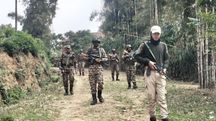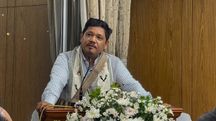COVID-19 and intensified racism in India
 Representative Image. Source: Wikimedia
Representative Image. Source: Wikimedia‘At a time when there is global uproar after the murder of George Floyed, and there is a call for dismantling the culture of systematic racism in the US, India still lives in denial.’
The notion of social justice guarantees us equal opportunity, and our constitution affords us this right. However, the prevalent systematic racism and oppression are something that many are unfamiliar with. Ever since COVID-19 broke out of China’s Wuhan, the virus is leading humanity to tremendous hardship across the world. So, amidst this hardship if we encounter the stigmatization of a certain race or ethnicity, it turns out to be quite unfortunate. It is uncanny how the two largest democracies of the world are employing the most undemocratic methods- massive incarceration, the prison system in the US and the Armed Forces Special Power Act (AFSPA) in India. In both countries, despite years of freedom and legislation aimed at addressing inequalities, educational institutions and work place have no legal accountability to address racist incidents.
In India, the outbreak of the novel Corona virus has once again flared up the stigmatization of people from the Northeast (NE) Region. While there is a certain level of tolerance and understanding towards the people from NE, there are still many from the so called ‘mainland’ India, who have considered people from the region as relatively backward both in terms of economy and infrastructure, as outsiders or lesser citizens of the country either due to ignorance or other discriminatory reasons. So, in the ongoing pandemic, we have heard a series of attacks encountered by the people from NE. While some were spat on, many were sent away from the grocery shops and evicted from their homes. A few others were kept in detention and quarantined for their mongoloid features, even though they had no COVID symptoms.
Rameshwori, an MPhil student of Delhi University was racially attacked (spat) by a man when she stepped out of her house in North Delhi’s Vijaynagar to get some groceries. And this incident unfortunately turned into one of the most traumatic incident of her life. Another girl from Manipur was on her way to Sarojoni Nagar in Delhi market and there she was tagged as ‘gandi virus’ by a group of men passing her. Rachungailiu Gonmei, a Master’s student at Hansraj College, was on her way back home and then she took a shared rickshaw as usual she has been doing for years. But,this time nobody wanted to share and the people silently moved to another rickshaw and the girl had to book the entire rickshaw privately for herself. So, this may be indirect or subtle but still counts as racism and now, the people are more insensitive and ignorant. Mercy Thiemneihtai, a manager at a medical clinic in Mumbai and according to her the virus has just given an excuse to express the people’s latent racism. She was pointed by two boys as corona on her way to the market. Even her sister was taunted by a group of children in her housing complex pointed her saying Chinese virus. Alana Golmei, founder of the North East Support Centre and Helpline was called corona virus by a staff member at NCERT office and therefore, recently wrote an open letter to the General Secretary of Ministry of Home Affairs NE Division about the growing racism in the wake of corona virus. In some places, people were even forcefully quarantined. For example, in Ahmedabad on 22nd March, police arrived at a company and took nine employees from Nagaland away for COVID-19 testing and despite negative results they were forcefully quarantined.On 28th of March, a student from Nagaland who stepped out of his flat in Mysuru was denied to enter the grocery shop, saying that they were not Indians. Many NE people especially students and professionals have been asked to vacate their rented accommodations for fear that they may be taking the disease the next door. Keeping aside the physical and verbal racism, corona virus has also brought a spike in online racism. Activist and former GS of the National Students Union of India was told to shift Wuhan on social media on Janata Curfew Day (22nd March).
Apart from this racism faced by the people of NE in the mainland, another tragedy that we can’t deny is the racism that is faced by the people within NE itself. Nurses employed at a private hospital in Assam’s Guwahati city have alleged that they have been verbally harassed and called “corona virus” by people on the streets. Later on, when they were asked they replied ,“This act is particularly disconcerting that they had to face such discrimination in Guwahati. In Delhi, they don’t understand that people from NE and China are different, but in Guwahati atleast they should understand”. So, here comes the question that how can the tribals of NE can feel safe in the mainland India when within NE itself their fundamental rights are threatened. It is sad to be targeted in your own place even after so much sensitization and awareness.
Apart from the Northeastern people, others who have been tested positive, or those in close contact with COVID-19 positive cases, or even those returning from affected countries, are facing societal harassment and abuse.
History has also shown us that a large- scale disease or outbreak is almost always accompanied by stigmas and prejudices against certain people. There’s always one community that bears the brunt of it. Sanglipong Lemtur, a research scholar at the center of social medicine and community health at JNU, mentions that “When it was AIDS, people targeted the gay community. Tuberculosis is nowadays associated with working class section of our society, where they become the targets of people’s fears and irrationality. And now with corona virus , people from China or East Asian- looking people are targeted and discriminated which may also impact the mental health of a person. Yengkhom Jilangamba , an Assistant Professor of Tata Institute of Social Sciences, wrote in ‘The Hindu’, “ Racism is most often felt, perceived, like an invisible wound, difficult to articulate or recall in the language of the law or evidence. In that sense everyday forms of racism are more experiential rather than an objectively identifiable situation”.
Also read: Depression: A real illness in society
Northeasterns across the country have faced pervasive racism from fellow Indians since the country’s foundation and India is still living in the ideas of its colonial past of class, caste and systematic racism. Just as the history of slavery and criminalization of the Black race is part of American Political system, India’s political system is incomplete without the marginalised histories of Schedule Castes, Schedule Tribes, Other Backward Class, Dalits, Adivasis and Religious minorities. A report titled “Corona virus Pandemic: India’s Mongoloid looking People Face Upsurge of Racism” by Rights and Risk Analysis Group (RRAG), a non-governmental organization, that was released on 26th March 2020 documented that racial discrimination took place in some popular restaurants and reputed educational institutions, including Kirori Mal College of University of Delhi, Tata Institute of Social Sciences, Mumbai and National Council of Educational Research and Training (NCERT).
The authorities, including law of the country, had taken certain measures to deal with the heights of racism, such as accepting a complaint or making an arrest. But, the continued incidents are the proves that such steps are not enough to counter the racist incidents. Many people have also come forward in order to project racism faced by the NE people in the mainland, for example, the recent movie, “AXONE”. But, here I would like to point out that, though the movie says that yes Racism is encountered by us, but, in the other hand it also tries to portray that the problem is within us, we are not able to mingle with the mainland Indians (blaming the victim). So, more robust and comprehensive steps are necessary to address the larger issue of racism. And if strong measures are not implemented, the virus of racism will inherently remain in the mindsets of people, which can be a threat to peace and solidarity of the society and the larger humanity.
Those leaders and people who have racial segregation on their minds or discriminatory attitude towards certain sections or groups of people should remind themselves that a disease like COVID-19 has no boundary, race, ethnicity or nationality. Everyone is susceptible to the virus. The world must stand together against the deadly virus rather than stigmatizing each other over the place of origin or its inhabitants. Collective consensus and efforts to fight the virus must be at the top priority since the number of infected countries and deaths are surging by the day. Racism should have no place in a civilized society.
About the author: Jahida Ibtesam Rahman, a student, pursuing a Masters Degree in Peace and Conflict Studies from Tata Institute of Social Sciences.
The views expressed are that of the author
Readers like you make Inside Northeast’s work possible.
To support our brand of fearless and investigative journalism, support us HERE.
Download:
The Inside Northeast app HERE for News, Views, and Reviews from Northeast India.
Do keep following us for news on-the-go. We deliver the Northeast.
Copyright©2026 Living Media India Limited. For reprint rights: Syndications Today









